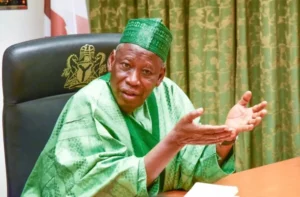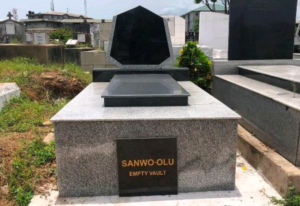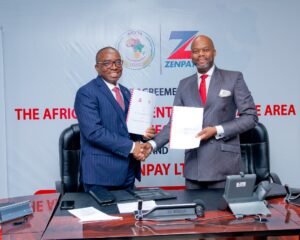Magu: Presidency Gets Legal Advice to Approach Supreme Court
3 min read The Presidency will soon approach the Supreme Court to make a pronouncement on the lingering crisis between the executive and the National Assembly over the powers of the President to appoint some heads of government agencies without recourse to the Senate based on the provisions of Section 171 of the Constitution.
The Presidency will soon approach the Supreme Court to make a pronouncement on the lingering crisis between the executive and the National Assembly over the powers of the President to appoint some heads of government agencies without recourse to the Senate based on the provisions of Section 171 of the Constitution.
A Presidency source, who disclosed this to journalists in Abuja, on Sunday, said the development was based on legal advice made available to the government on the different interpretations of the law on the matter.
Magu: APC’s intervention in Presidency, N’Assembly feud deadlocked
The Acting President, Yemi Osinbajo, had, in an interview in April, ruled out the possibility of President Muhammadu Buhari replacing the acting Chairman of the Economic and Financial Crimes Commission, Ibrahim Magu, whose nomination was rejected by the Senate twice.
He had said he aligned himself with the argument of a Senior Advocate of Nigeria, Mr. Femi Falana, that Senate confirmation was not needed for the EFCC chairman based on the provisions of Section 171 of the Constitution.
Osinbajo’s statement drew the anger of Senators, who, penultimate Tuesday, resolved to step down all requests for confirmation into executive positions from the Presidency.
A source in the government said on Sunday that the legal advice, prepared as a working document in the Presidency regarding the differences in the constitutional interpretations on matters of certain federal appointments, recommended that a judicial pronouncement, preferably by the Supreme Court, would settle the matter.
He said although the Presidency believed that Section 171 was clear that certain appointments did not require Senate’s consent, it (the Presidency) was not behaving as if its interpretation of the law had become a policy.
Senate to Presidency: No going back on Magu
The source stated that the Presidency was persuaded that its interpretation was the correct one, but it was conscious and aware of the fact that only a proper judicial ruling on the matter would make it a settled policy on point of law.
He added that the advice unearthed a ruling of the Supreme Court on the matter, where the current Chief Justice of Nigeria, Justice Walter Onnoghen, before his elevation as the CJN, had ruled in line with the view of the Presidency on the matter.
Onnoghen was quoted to have ruled that wherever and whenever the Constitution speaks, any provision of an Act/Statute on the same subject matter, must remain silent.
“The divergent positions being held by the executive and the legislature on the subject of confirmation is one that requires timely and ultimate resolution. Such resolution could only be reached through judicial process.
“Such interpretation would lay to rest the lingering crisis between the two arms,” the source stated, quoting the recommendation made in the legal advice.
Specifically on Magu, he said the advice concluded that “the rumblings in the discourse on the confirmation of the EFCC chairman have more to do with politics that with the law.”
The advice, which affirms the powers of the President to appoint, in acting capacity, into positions such as the EFCC chairmanship, according to the source, also noted that “in the recent past, the ministerial nomination of the late Prof. Abraham Babalola Borishade (Ekiti State) by (former) President Olusegun Obasanjo was rejected repeatedly by the Senate.”
It added, “In fact, it will be recalled that this particular nomination was presented four times in 18 months before it was eventually confirmed by the Senate.
“This position is because of the long established and entrenched principle of law that any legislation, that is inconsistent with the provision of the Constitution, is null and void and of no effect whatsoever to the extent of such inconsistency. (See the Supreme Court cases of DR. OLUBUKOLA ABUBAKAR SARAKI v. FEDERAL REPUBLIC OF NIGERIA (2016) LPELR-40013 (SC) and CHIEF ISAAC EGBUCHU v. CONTINENTAL MERCHANT BANK PLC & ORS (2016) LPELR-40053 (SC).
“In the case of CHIEF ISAAC EGBUCHU v. CONTINENTAL MERCHANT BANK PLC & ORS (Supra), Walter Samuel Nkanu Onnoghen, who today is the Chief Justice of the Federation, held, at page 19, paragraph C, ‘The time-honoured principle of law is that wherever and whenever the Constitution speaks any provision of an Act/Statute, on the same subject matter, must remain silent’.”
Despite its position on the matter, the government official said it was not accurate to say the Presidency had started to act unilaterally on its own interpretation of Section 171.








